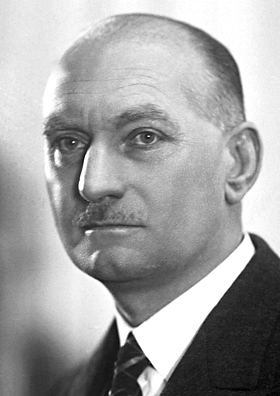Corneille Heymans
Corneille Jean François Heymans (28 March 1892 – 18 July 1968) was a Belgian physiologist who won the Nobel Prize in Physiology or Medicine in 1938 for his discoveries concerning the role played by the sinus and aortic mechanisms in the regulation of respiration.
Early Life and Education[edit | edit source]
Corneille Heymans was born in Ghent, Belgium, into a family with a strong academic background. His father, Jean-François Heymans, was a professor of pharmacology at the University of Ghent. Corneille followed in his father's footsteps, studying medicine at the same university and obtaining his medical degree in 1920.
Academic Career[edit | edit source]
After completing his medical degree, Heymans pursued further studies in physiology and pharmacology in various European cities, including Paris, Lausanne, Vienna, and London. He returned to the University of Ghent, where he became a professor of pharmacology in 1930.
Research and Discoveries[edit | edit source]
Heymans is best known for his pioneering research on the regulation of respiration. His experiments demonstrated how the body senses changes in blood chemistry and adjusts breathing accordingly. He discovered that the carotid body and the aortic body are chemoreceptors that detect changes in blood oxygen levels and send signals to the brain to regulate breathing.
Nobel Prize[edit | edit source]
In 1938, Heymans was awarded the Nobel Prize in Physiology or Medicine for his discoveries concerning the role of the sinus and aortic mechanisms in the regulation of respiration. His work provided a deeper understanding of how the body maintains homeostasis and responds to changes in the environment.
Later Life and Legacy[edit | edit source]
Heymans continued his research and teaching at the University of Ghent until his retirement. He was a member of several scientific societies and received numerous honors for his contributions to physiology and medicine. Heymans passed away on 18 July 1968, leaving behind a legacy of groundbreaking research that continues to influence the field of respiratory physiology.
Related pages[edit | edit source]
Search WikiMD
Ad.Tired of being Overweight? Try W8MD's physician weight loss program.
Semaglutide (Ozempic / Wegovy and Tirzepatide (Mounjaro / Zepbound) available.
Advertise on WikiMD
|
WikiMD's Wellness Encyclopedia |
| Let Food Be Thy Medicine Medicine Thy Food - Hippocrates |
Translate this page: - East Asian
中文,
日本,
한국어,
South Asian
हिन्दी,
தமிழ்,
తెలుగు,
Urdu,
ಕನ್ನಡ,
Southeast Asian
Indonesian,
Vietnamese,
Thai,
မြန်မာဘာသာ,
বাংলা
European
español,
Deutsch,
français,
Greek,
português do Brasil,
polski,
română,
русский,
Nederlands,
norsk,
svenska,
suomi,
Italian
Middle Eastern & African
عربى,
Turkish,
Persian,
Hebrew,
Afrikaans,
isiZulu,
Kiswahili,
Other
Bulgarian,
Hungarian,
Czech,
Swedish,
മലയാളം,
मराठी,
ਪੰਜਾਬੀ,
ગુજરાતી,
Portuguese,
Ukrainian
Medical Disclaimer: WikiMD is not a substitute for professional medical advice. The information on WikiMD is provided as an information resource only, may be incorrect, outdated or misleading, and is not to be used or relied on for any diagnostic or treatment purposes. Please consult your health care provider before making any healthcare decisions or for guidance about a specific medical condition. WikiMD expressly disclaims responsibility, and shall have no liability, for any damages, loss, injury, or liability whatsoever suffered as a result of your reliance on the information contained in this site. By visiting this site you agree to the foregoing terms and conditions, which may from time to time be changed or supplemented by WikiMD. If you do not agree to the foregoing terms and conditions, you should not enter or use this site. See full disclaimer.
Credits:Most images are courtesy of Wikimedia commons, and templates, categories Wikipedia, licensed under CC BY SA or similar.
Contributors: Prab R. Tumpati, MD

